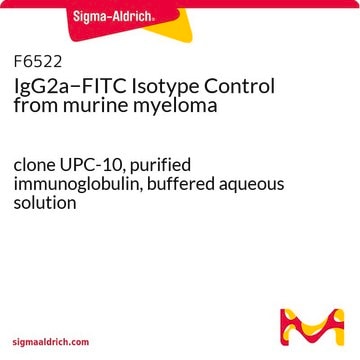MABC004F
Mouse IgG2a Negative Control, clone GC270, FITC conjugate
Mouse IgG2a Negative Control Monoclonal Antibody validated for use in Flow Cytometry & Immunofluorescence.
Sign Into View Organizational & Contract Pricing
All Photos(1)
About This Item
UNSPSC Code:
12352203
eCl@ss:
32160702
NACRES:
NA.42
Recommended Products
biological source
mouse
Quality Level
conjugate
FITC conjugate
antibody form
ascites fluid
clone
GC270, monoclonal
manufacturer/tradename
Chemicon®
technique(s)
flow cytometry: suitable
immunofluorescence: suitable
isotype
IgG2a
shipped in
wet ice
target post-translational modification
unmodified
Specificity
This antibody reacts with the outer membrane protein of some strains of Neisseria gonorrhoeae. No reaction with human cell surface or plasma components has been observed. However, some binding to Fc receptors may occur.
Immunogen
Protein I preparation from Neisseria gonorrhoeae.
Application
Fluorescein conjugated mouse IgG2a is a monoclonal antibody intended for use as a negative control in immunofluorescence, flow cytometry. Its use enables an estimation of non-specific binding of mouse monoclonal antibodies to cell surface components in peripheral blood and tissue.
SUGGESTED USAGE
Flow cytometry and immunofluorescence - use 10 μl direct from the vial per 100 μl of whole blood, or 1 x 10E6 peripheral blood mononuclear cells (PBMC) or bone marrow cells in 100 μl buffer.
SUGGESTED USAGE
Flow cytometry and immunofluorescence - use 10 μl direct from the vial per 100 μl of whole blood, or 1 x 10E6 peripheral blood mononuclear cells (PBMC) or bone marrow cells in 100 μl buffer.
Mouse IgG2a Negative Control Monoclonal Antibody validated for use in Flow Cytometry & Immunofluorescence.
Research Category
Secondary & Control Antibodies
Epitope Tags & General Use
Secondary & Control Antibodies
Epitope Tags & General Use
Research Sub Category
Isotype Control Antibodies
Isotype Control Antibodies
Physical form
Purified from mouse ascitic fluid. Fluorescein conjugated, ready to use. The antibody is supplied in 1.0ml phosphate buffered saline, pH 7.4, containing 0.2% bovine serum albumin and 0.1% sodium azide. The characteristics of each lot are tested by electrophoresis and flow cytometry.
Storage and Stability
Store at 2 to 8°C, for up to 6 months. DO NOT FREEZE. Protect from light.
WARNING: The monoclonal reagent solution contains 0.1% sodium azide as a preservative. Due to potential hazards arising from the build up of this material in pipes, spent reagent should be disposed of with liberal volumes of water.
WARNING: The monoclonal reagent solution contains 0.1% sodium azide as a preservative. Due to potential hazards arising from the build up of this material in pipes, spent reagent should be disposed of with liberal volumes of water.
Legal Information
CHEMICON is a registered trademark of Merck KGaA, Darmstadt, Germany
Disclaimer
Unless otherwise stated in our catalog or other company documentation accompanying the product(s), our products are intended for research use only and are not to be used for any other purpose, which includes but is not limited to, unauthorized commercial uses, in vitro diagnostic uses, ex vivo or in vivo therapeutic uses or any type of consumption or application to humans or animals.
Storage Class
12 - Non Combustible Liquids
wgk_germany
WGK 2
flash_point_f
Not applicable
flash_point_c
Not applicable
Certificates of Analysis (COA)
Search for Certificates of Analysis (COA) by entering the products Lot/Batch Number. Lot and Batch Numbers can be found on a product’s label following the words ‘Lot’ or ‘Batch’.
Already Own This Product?
Find documentation for the products that you have recently purchased in the Document Library.
S Chinnapaiyan et al.
PloS one, 12(1), e0169161-e0169161 (2017-01-07)
Recurrent lung infections and pneumonia are emerging as significant comorbidities in the HIV-infected population in the era of combination antiretroviral therapy (cART). HIV infection has been reported to suppress nasal mucociliary clearance (MCC). Since the primary components driving nasal MCC
Eleonora Cimini et al.
Microorganisms, 7(9) (2019-09-25)
An expansion of effector/activated Vδ2 T-cells was recently described in acute Zika virus (ZIKV)-infected patients, but their role in the protective immune response was not clarified. The aim of this study was to define the antiviral activity of Vδ2 T-cells
Huifen Li et al.
Journal of virological methods, 221, 127-130 (2015-05-11)
Human cytomegalovirus (hCMV) is a ubiquitous pathogen that causes congenital infection and severe infections in immunocompromised patients. Chronic hCMV infection may also play an important role in immunosenescence and adverse health outcomes in older adults. THP-1, a human monocytic cell
Our team of scientists has experience in all areas of research including Life Science, Material Science, Chemical Synthesis, Chromatography, Analytical and many others.
Contact Technical Service








